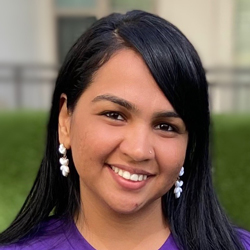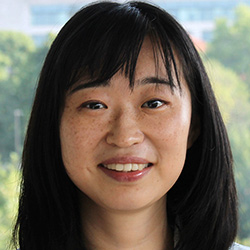Three New Affiliate Faculty Members Join Northwestern Computer Science
Professors Nivedita Arora, Matt Groh, and Ermin Wei join the team of affiliate faculty members helping to advance the department’s multidisciplinary academic and research mission
Northwestern Computer Science continues to strengthen and expand research collaborations within Northwestern Engineering and across the University, welcoming its three newest affiliated faculty members — Nivedita Arora, Matt Groh, and Ermin Wei — to advance the department’s multidisciplinary academic mission.
“Our department is delighted to welcome three new courtesy faculty members. Our courtesy faculty join the vibrant community that we have created around computing at Northwestern and participate in many department activities such as advising CS graduate students,” said Samir Khuller, Peter and Adrienne Barris Chair of Computer Science at the McCormick School of Engineering. “We are proud that we have courtesy faculty from many departments and schools at Northwestern. We often see them at department talks and workshops and they are also engaging in a variety of research projects with CS faculty and students.”
Nivedita Arora

Working at the intersection of novel materials, low-power embedded systems, human-computer interaction, and design, Arora is passionate about designing sustainability-first computing systems and exploring their applications.
Prior to joining Northwestern, Arora held a postdoctoral researcher position in the School of Interactive Computing at the Georgia Institute of Technology (Georgia Tech), advised by adjunct associate professor Josiah Hester. Arora earned a PhD in computer science and a master’s degree in human-computer interaction (HCI), both from Georgia Tech, where she was advised by Gregory Abowd and Thad Starner.
Arora’s research has been published in the proceedings of top-tier ACM systems and HCI venues such as ACM Interactive, Mobile, Wearable and Ubiquitous Technologies; ACM Symposium on User Interface Software and Technology; and ACM International Conference on Mobile Systems, Applications, and Services. Her work has been recognized in Communications of the ACM and SIGMOBILE's GetMobile Magazine, two best paper awards from ACM IMWUT and the ACM Conference on Embedded Networked Sensor Systems International Workshop on Energy Harvesting & Energy-Neutral Sensing Systems, and two best poster awards from MobiSys and UIST.
Arora also received several awards at Georgia Tech, including the ACM UbiComp Gaetano Borriello Outstanding Student Award, GVU Foley Scholar, College of Computing Outstanding GRA Award, Rising Stars in EECS, and Faces of Inclusive Excellence.
Matt Groh

Groh examines the dynamics of human-AI collaboration with a focus on deepfake detection, medical diagnosis aided by computer vision, and empathic communication. His guiding research question is: “How can we design AI systems to help people solve problems more effectively?”
Groh’s work has recently appeared in Nature Medicine, Science, Proceedings of the National Academy of Science, Computer Supported Collaborative Work, and Affective Computing and Intelligent Interactions.
Lately, Groh has been collaborating with members of the Midwest Uncertainty Collective — including Jessica Hullman, Ginni Rometty Professor and associate professor of computer science; computer science PhD student Negar Kamali; and postdoctoral scholar in computer science Angelos Chatzimparmpas — to design and evaluate decision support tools to help people more effectively distinguish between AI-generated and authentically captured images.
Prior to joining Northwestern, Groh cofounded a startup that developed tailored sensor analytics and sport-specific performance tracking smartwatch applications. He also held data scientist roles at cyber security startup Expanse, an education technology startup called RaiseMe, the non-profit organization Innovations for Poverty Action, the World Bank, and the Defense Advanced Research Projects Agency.
Groh earned an MA and PhD in media arts and sciences from MIT. He completed a bachelor’s degree in economics with minors in Arabic and mathematics from Middlebury College.
“I look forward to joining the CS seminars and participating in many interdisciplinary research collaborations.” Groh said.
Ermin Wei

Wei's research interests include distributed optimization methods, convex optimization and analysis, smart grid, communication systems and energy networks, and market economic analysis.
“My research interest lies at the intersection of network control, algorithm design, and economics. Our CS department has significant strengths in all these domains,” Wei said. “I'm excited to explore closer collaboration and interaction with CS colleagues and students, in both research and social aspects.”
In the short-term, Wei’s team is working on developing and analyzing distributed algorithms for networked systems with hardware constraints, including robotic networks, energy networks, and federated learning systems. Her lab is also building behavior-based economical models to study the interactions of bounded rational agents.
In the long-term, Wei aims to design an efficient and robust system that includes both fully controllable and self-interested agents.
Wei’s Team GO-SNIP — which included faculty members, students, and alumni — finished second place in Challenge 1 and seventh place in Challenge 2 of the Department of Energy’s (DOE) Grid Optimization (GO) Competition, a global contest that challenges teams to develop software management solutions for challenging power grid problems.
Advised by Asu Ozdaglar, Wei earned a PhD in electrical engineering and computer science in 2014 at MIT, where she also obtained a master’s degree. Wei received triple undergraduate degrees in computer engineering, finance, and mathematics with a minor in German, from the University of Maryland, College Park.
